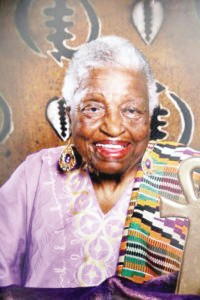Millie Charles, educator, social worker, dies
30th November 2020 · 0 Comments
By Fritz Esker
Contributing Writer
Educator, social worker and civil rights activist Millie Charles died at her home on Friday, November 20. She was 97.
Charles founded the SUNO School of Social Work in 1983. She was the school’s dean until her retirement in 2006. When she began working at SUNO in 1965, she was the only person in the social work department. When she retired, there were over 30 employees in the department. In 2015, SUNO broke ground on the 40,000-square-foot Millie M. Charles School of Social Work Building on the SUNO Lake Campus.
Dr. Rebecca Chaisson, dean of the school of social work at SUNO, said Charles’ efforts put SUNO on the map nationally. Chaisson said she has fielded many calls from social workers around the country who spoke of the inspiration and influence Charles had on their lives and careers.
Chaisson added that Charles’ work was not limited to the classroom. “Millie used her courage and her knowledge to push for change in the community,” Chaisson said.
In a 2012 interview with The Louisiana Weekly, Charles revealed that her goals were simple when she began her career with SUNO.
“I was just looking for a job, and I found out the state was hiring,” Charles said in 2012.
Born in New Orleans as Millie Ruth McClelland, Charles grew up as the daughter of a Baptist preacher during the Jim Crow era of racial segregation. Charles’ mother died when she was only 8 years old. She graduated from Dillard University with an education degree, then taught in Columbia, La., and Charleston, South Carolina. She worked for a year in Japan with the Red Cross. During a return to New Orleans before what she thought would be a working stint in Europe, Charles met and fell in love with a Howard University student named Charles Carroll Charles. They married in 1950, but Charles died while Millie was pregnant with their only child, who now goes by the name H.M.K. Amen.
After her husband’s tragic death, Charles returned to school to further her education so she could better provide for her child. When she pursued her master’s degree at LSU, she was sometimes the only Black student on campus.
In 1975, the National Association of Social Workers named Charles the social worker of the year. She also received the 1995 National Association of Social Workers’ Pioneer Award, the Founders’ Award from the New Orleans Chapter of the National Association of Black Social Workers in 1979, and an honorary doctorate from Dillard University in 1993.
Even though she received many honors throughout her career, she never liked being in the spotlight. In a 2004 interview with The Times-Picayune, veteran Louisiana social work administrator Mary Joseph called Charles “the Mother Teresa of social work.” Joseph discussed how quick Charles was to help families in need.
“If there was a shooting, for example, or a murder, or a family burned out, you would find Millie somewhere with some group, trying to figure out how they were going to help that family,” Joseph told The Times-Picayune in 2004.
Charles told The Louisiana Weekly in 2012 that her work was always about making a difference for people in her community. She gave the following advice to anyone who wanted to pursue a similar path.
“You need to be true to a cause that extends beyond yourself,” Charles said in 2012. “Do it for others – that’s the only way we can change this thing for Black people.”
Louisiana Congressman Cedric Richmond (D, LA-02) issued a statement on Charles’ passing.
“Mrs. Millie Charles will be sorely missed,” said Richmond. “She dedicated her lifetime to serving and uplifting families and communities of New Orleans. For nearly a century, she was steadfast in her efforts as an educator, social worker, civil rights activist, and social justice advocate…I am proud of the legacy Mrs. Charles has left in New Orleans.”
New Orleans Mayor LaToya Cantrell also praised Charles.
“She is practically the godmother of modern-day social workers in New Orleans,” Cantrell said. “She wore many hats – from social worker to civil rights activist – and she made a difference in the lives of countless New Orleanians.”
This article originally published in the November 30, 2020 print edition of The Louisiana Weekly newspaper.




